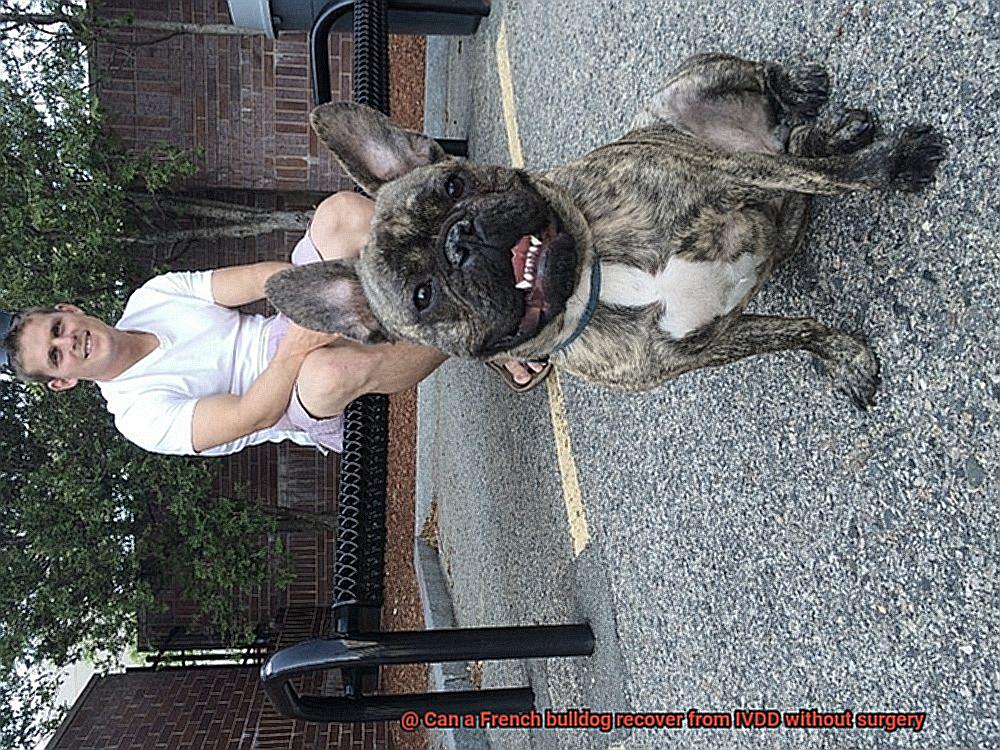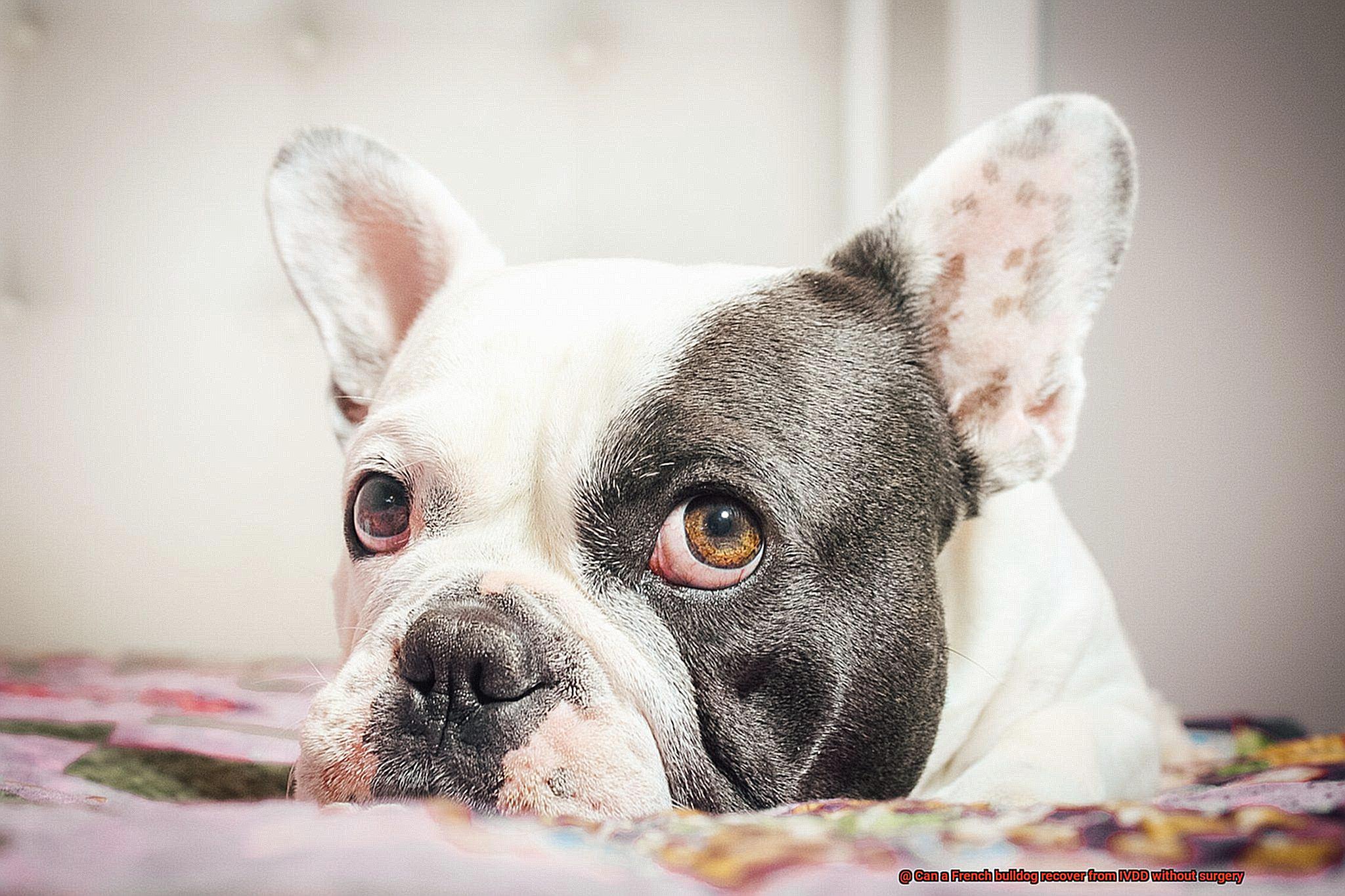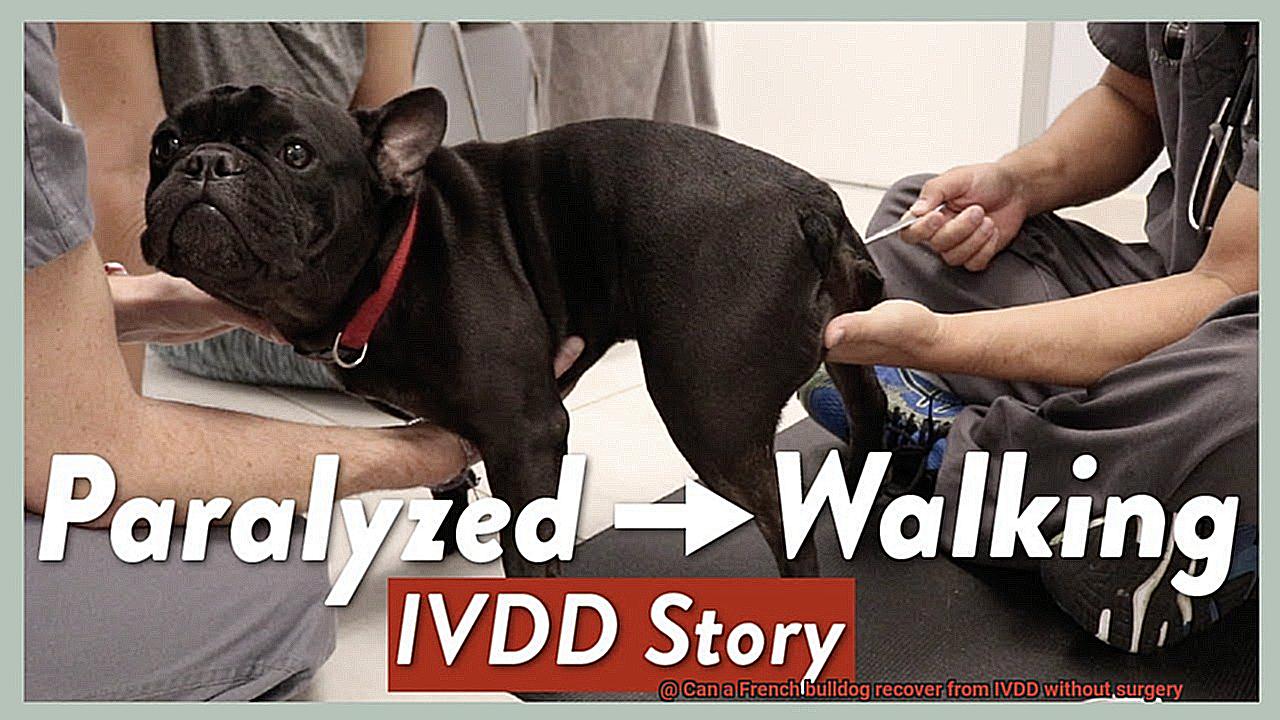Can a French bulldog recover from IVDD without surgery?
They’re the adorable, squish-faced companions that have stolen the hearts of dog lovers everywhere. But just like any other breed, they can face health challenges. One common condition that affects French Bulldogs is Intervertebral Disc Disease (IVDD). This sneaky ailment occurs when the cushions between their spinal vertebrae start to deteriorate, causing pain, mobility issues, and even paralysis. It’s a tough situation to be in, but here’s the burning question: Is surgery the only way out?
In this blog post, we’re diving headfirst into the world of IVDD in French Bulldogs. We’ll explore what causes it, what outcomes you can expect, and most importantly, non-surgical treatments that could give your furry friend a fighting chance at recovery.
So how does this pesky IVDD come about? Well, it can be caused by genetics, obesity (hey, we all love treats.), or simply the natural aging process. When French Bulldogs are affected by this condition, they might experience symptoms like back pain or hind limb weakness – or worse yet – complete paralysis. Yikes.
But don’t panic just yet. Surgery isn’t always the only option on the table. There are non-surgical treatments that could help your four-legged buddy bounce back without breaking the bank or compromising their overall health.
One promising avenue is physical therapy – not just for humans anymore. Skilled therapists can create exercise plans tailored specifically for IVDD patients. These exercises aim to strengthen muscles and improve mobility so your Frenchie can strut their stuff once again.
Another weapon in our non-surgical arsenal is anti-inflammatory medications. These little wonders work to reduce pain and swelling in those delicate spinal areas. With less discomfort holding them back, your pup will have a better shot at regaining their lost vigor.

Now, let’s be real. Non-surgical options might not guarantee a full recovery, but they can vastly improve your French Bulldog’s quality of life and increase their chances of getting back on their paws. Of course, the success of these treatments depends on the severity of IVDD and how your individual pup responds.
So here’s the bottom line: Surgery is often seen as the holy grail for treating IVDD in French Bulldogs, but it’s not always feasible or affordable. That’s where non-surgical treatments swoop
Symptoms of IVDD in French Bulldogs
Contents
- 1 Symptoms of IVDD in French Bulldogs
- 2 Causes of IVDD in French Bulldogs
- 3 Diagnosis and Treatment Options for IVDD in French Bulldogs
- 4 Non-Surgical Treatment for IVDD in French Bulldogs
- 5 Rest as a Non-Surgical Treatment for IVDD in French Bulldogs
- 6 Medications as a Non-Surgical Treatment for IVDD in French Bulldogs
- 7 Physical Therapy as a Non-Surgical Treatment for IVDD in French Bulldogs
- 8 Alternative Therapies as a Non-Surgical Treatment for IVDD in French Bulldogs
- 9 Conclusion
We all know our four-legged friends are full of energy and spunk. But what happens when they start experiencing pain or mobility issues? One common spinal condition that can affect our beloved Frenchies is intervertebral disc disease (IVDD). In this blog post, we’ll dive into the symptoms of IVDD in French Bulldogs, helping you spot the signs early on and take action.
Change in Gait or Mobility:
Is your Frenchie wobbling or dragging their hind legs? That’s a red flag. IVDD can cause a change in gait, making it difficult for your furry friend to walk normally. Keep an eye out for a hunched back or reluctance to jump, climb stairs, or play as usual.
Weakness or Paralysis in Hind Limbs:
If you notice your Frenchie struggling to support their weight or experiencing complete paralysis in their hind limbs, it’s time to act fast. IVDD can lead to varying degrees of weakness or even complete immobility.
Bladder and Bowel Control Issues:
Accidents in the house might not always be a result of poor training. IVDD can affect your Frenchie’s ability to control their bladder and bowel movements. If you notice sudden changes in their bathroom habits, it’s time to consult with your vet.
Signs of Pain or Discomfort:
Our French Bulldogs can’t speak, but they sure can show us when something’s wrong. Watch out for vocalizations when touched or handled, increased irritability or aggression, restlessness, or difficulty settling comfortably. These may indicate pain or discomfort caused by IVDD.
Causes of IVDD in French Bulldogs
French Bulldogs are adorable and lovable companions, but they are also prone to certain health issues, one of which is intervertebral disc disease (IVDD). As a responsible French Bulldog owner, it’s essential to understand the causes of this condition to prevent its occurrence or manage it effectively. Let’s dive into the factors that can contribute to IVDD in French Bulldogs:
- Genetics – The genes your French Bulldog inherits play a significant role in their susceptibility to IVDD. Certain genetic factors, including body structure and mutations affecting disc quality, can increase the likelihood of developing this condition. So, when choosing a French Bulldog puppy, it’s crucial to select a reputable breeder who prioritizes health screening and breeding practices.
- Age – Just like us humans, our furry friends experience changes as they age. As French Bulldogs get older, their spinal discs naturally degenerate, becoming less resilient. This age-related degeneration increases the risk of IVDD. Regular veterinary check-ups and monitoring your dog’s health as they age are crucial to catch any signs of IVDD early on.
- Weight – Maintaining a healthy weight is essential for French Bulldogs to prevent various health issues, including IVDD. Excess weight puts extra stress on their spinal discs, making them more prone to damage or degeneration. So, be mindful of your Frenchie’s diet and ensure they get regular exercise to keep them fit and within an ideal weight range.
- Trauma – Accidents happen, and unfortunately, they can lead to serious consequences for our beloved French Bulldogs. Traumatic events that cause sudden and excessive pressure on the spinal discs can result in IVDD. Whether it’s a fall, accident, or rough play, it’s vital to take precautions to minimize your Frenchie’s risk of injury.
- Lifestyle – Our furry friends’ lifestyle choices can also impact their spinal health. Certain activities that involve repetitive twisting or bending of the spine, like jumping on and off furniture or climbing stairs, can increase the risk of disc damage over time. Additionally, prolonged periods of inactivity or lack of exercise can weaken the muscles and ligaments supporting the spine, making it more vulnerable to IVDD.
By understanding these causes, you can take proactive steps to reduce the risk of IVDD in your French Bulldog. Regular exercise, a balanced diet, and avoiding activities that strain the spine can go a long way in promoting spinal health. Additionally, providing a safe environment and being cautious of potential traumas can help protect your Frenchie’s back.
Remember, while these factors increase the likelihood of IVDD, not every French Bulldog will develop this condition. However, being aware of the risks and taking preventive measures is crucial for the overall well-being of your furry friend. If you notice any symptoms or changes in your French Bulldog’s behavior, consult with your veterinarian for a proper diagnosis and treatment plan.
Diagnosis and Treatment Options for IVDD in French Bulldogs
French Bulldogs are known for their charming personalities and unique appearance, but they are also prone to certain health conditions, one of which is intervertebral disc disease (IVDD). IVDD occurs when the intervertebral discs in the spine degenerate, leading to bulging or herniation that can compress the spinal cord or nerves. In this article, we will explore the diagnosis and treatment options for IVDD in French Bulldogs to help you better understand this condition and how to best care for your furry friend.
Diagnosis of IVDD in French Bulldogs
If you suspect that your French Bulldog may be suffering from IVDD, it is important to seek veterinary care promptly. A veterinarian specializing in spinal conditions will perform a thorough physical examination, including assessing your dog’s gait, reflexes, and overall mobility. They may also conduct neurological evaluations to identify any signs of spinal cord compression.
In addition to the physical examination, diagnostic imaging techniques such as X-rays or MRI scans may be used to visualize the condition of the intervertebral discs and identify any herniations or abnormalities. These imaging techniques provide valuable information that helps veterinarians make an accurate diagnosis and determine the best course of treatment.
Treatment Options for IVDD in French Bulldogs
The treatment options for IVDD in French Bulldogs can vary depending on the severity of the condition. In mild cases, conservative management may be recommended. This typically involves strict rest to minimize further damage to the spinal cord or nerves. Pain management medications and anti-inflammatory drugs may also be prescribed to reduce swelling and alleviate pain.
Physical therapy and rehabilitation exercises can play a crucial role in managing IVDD in French Bulldogs. These exercises aim to improve muscle strength and flexibility, which can help support the spine and reduce the risk of further injury. Your veterinarian may recommend specific exercises or refer you to a veterinary physical therapist who specializes in canine rehabilitation.
In more severe cases of IVDD where there is significant spinal cord compression or paralysis, surgical intervention may be necessary. There are several surgical techniques available for treating IVDD in French Bulldogs, including fenestration, hemilaminectomy, and ventral slot procedures. These surgeries aim to remove or decompress the herniated disc material and relieve pressure on the spinal cord.
It is important to note that not all French Bulldogs with IVDD require surgery. The decision to proceed with surgery depends on the individual dog’s condition, symptoms, and response to conservative management. Some French Bulldogs may show improvement with non-surgical treatment alone, while others may require surgical intervention for a better chance of recovery.
Recovery and Follow-Up Care
Recovery from IVDD in French Bulldogs can vary depending on the severity of the condition and the chosen treatment approach. Dogs undergoing surgery may require a period of hospitalization and post-operative care, including restricted activity and physical therapy. It is crucial to follow the veterinarian’s recommendations for post-operative care to ensure a successful recovery.
Non-Surgical Treatment for IVDD in French Bulldogs

Picture this: you’re taking a leisurely stroll with your adorable French Bulldog, Mr. Snuggles, when suddenly, he lets out a yelp of pain and starts dragging his hind legs. Panicked, you rush to the vet and discover that Mr. Snuggles has IVDD, a common condition in Frenchies.
There are non-surgical treatment options that can help your pup get back on his paws.
Conservative Management: Rest and Recover
The first step in non-surgical treatment is strict rest and confinement. This means crate rest or restricting your pup’s movement to a small area. It may sound ruff, but it’s paw-sitively crucial for preventing further damage to the spine. Just imagine telling Mr. Snuggles, “Sorry bud, no zoomies today.”
Pain Management: No More Achy Breaky Back
Pain relief is key in helping your furry friend feel better. Your vet may prescribe nonsteroidal anti-inflammatory drugs (NSAIDs) to alleviate pain and reduce inflammation. These meds can work wonders for Mr. Snuggles’ achy breaky back.
Muscle Relaxants: Spa Day for the Spine
Muscle spasms can be a real pain in the neck (or back, in this case). Muscle relaxants can help ease those spasms and provide relief to the affected area. It’s like giving your pup a spa day for his spine.
Physical Therapy and Rehabilitation: Get Those Muscles Pumping
Physical therapy and rehabilitation are essential components of non-surgical treatment. These therapies aim to strengthen the supportive muscles around the spine, improve range of motion, and promote healing. Picture Mr. Snuggles rocking some doggy squats and stretching his way to recovery.
Alternative Treatments: Nature’s Healing Touch
Sometimes, Mother Nature has a trick or two up her sleeve. Acupuncture and chiropractic care can work wonders in relieving pain and improving mobility. And if you’re feeling adventurous, herbal supplements, homeopathic remedies, or natural goodies like turmeric or omega-3 fatty acids may also be recommended. It’s like giving Mr. Snuggles a spa day with a side of healthy treats.
Remember, not all cases of IVDD can be successfully managed without surgery. The severity of the condition, the location of disc herniation, and your pup’s response to conservative treatment should be evaluated by a veterinarian. So make sure to schedule those follow-up visits to monitor Mr. Snuggles’ progress and make any necessary adjustments to his treatment plan.
Rest as a Non-Surgical Treatment for IVDD in French Bulldogs
Today, we’re going to talk about a crucial aspect of treating IVDD in our furry friends – the power of rest. Rest is a non-surgical treatment option that plays a significant role in allowing the body to heal naturally and reduce inflammation.
Importance of Rest:
When your French Bulldog is diagnosed with IVDD, rest becomes their best friend. Here’s why:
- Natural Healing: Resting provides the body with the time it needs to heal itself without the need for invasive procedures. It allows the inflammation to subside and promotes tissue repair.
- Reduced Pressure on Spinal Cord: By limiting movement, rest helps alleviate pressure on the spinal cord, preventing further damage and allowing it to recover.
Types of Rest:
To ensure effective recovery, different types of rest may be recommended:
- Crate Rest: This involves confining your Frenchie to a crate or small area to minimize movement and prevent any physical strain.
- Limited Activity: During rest periods, you should restrict your dog’s physical activity, including jumping, running, and playing.
Benefits of Rest:
Here are some benefits your French Bulldog can enjoy through rest:
- Decreased Risk of Further Injury: By limiting movement, you reduce the chances of your Frenchie aggravating their condition or causing additional harm.
- Reduced Inflammation: Resting helps to reduce inflammation around the affected area, promoting healing and reducing pain.
Tips for Implementing Rest:
To make rest more comfortable for your furry friend, consider these tips:
- Create a Comfortable Space: Designate a quiet and cozy area where your Frenchie can relax undisturbed.
- Use a Crate or Confinement Area: Utilize a crate or confinement area to limit their movement and ensure they don’t overexert themselves.
- Limit Physical Activity: Avoid activities that put strain on their back, such as climbing stairs or jumping on furniture.
Duration of Rest:
The duration of rest required for recovery varies depending on the severity of your Frenchie’s IVDD. Your veterinarian will guide you on the recommended duration.
Additional Measures:
In addition to rest, your vet may recommend pain medication or physical therapy to support your furry friend’s recovery.
Addressing Concerns:
Some common concerns about using rest as a treatment option are muscle atrophy and boredom. However, your vet can provide guidance on exercises to prevent muscle loss, and mental stimulation can keep your Frenchie entertained during their rest period.
Medications as a Non-Surgical Treatment for IVDD in French Bulldogs
If your furry buddy is battling intervertebral disc disease (IVDD), you’re probably looking for ways to help them feel better without resorting to surgery. Well, fret not. In this article, we’ll explore the role of medications in the non-surgical treatment of IVDD in our adorable Frenchies. So, let’s dive right in.
Nonsteroidal Anti-Inflammatory Drugs (NSAIDs):
These superheroes can help manage pain and reduce inflammation associated with IVDD. Think of them as the caped crusaders fighting off those pesky prostaglandins responsible for pain and inflammation. Commonly prescribed NSAIDs like carprofen, meloxicam, and deracoxib can provide some much-needed relief to your Frenchie.
Muscle Relaxants:
Tense muscles can add to your pup’s discomfort. That’s where muscle relaxants come to the rescue. Diazepam is a trusty sidekick that helps relieve muscle spasms and tension when used alongside NSAIDs. Together, they form a dynamic duo that can make your Frenchie feel more at ease.
Analgesics for Pain Management:
Pain relief is an absolute must when it comes to treating IVDD without surgery. Enter analgesics like tramadol, which block those pesky pain signals in the brain. Remember, though, these powerful tools should only be used under the watchful eye of a veterinarian to ensure safe and effective treatment.
Corticosteroids:
When inflammation and swelling are causing trouble for your Frenchie’s spinal cord, corticosteroids like prednisone can save the day. These anti-inflammatory champions reduce swelling, relieving pressure on the spinal cord. However, caution is key, as corticosteroids come with potential side effects and may not be suitable for every pup.
Supplements for Joint Health:
To support joint health and minimize further disc degeneration, supplements like glucosamine and chondroitin can work wonders. These natural wonders promote mobility, reduce pain, and keep your Frenchie’s joints in tip-top shape.
Remember, medication alone might not be enough. Combining it with strict crate rest, physical therapy, and other supportive measures ensures the best outcome for your furry friend. Regular check-ups with your vet are vital to monitor progress, adjust medication dosages if needed, and make any necessary changes to the treatment plan.
Physical Therapy as a Non-Surgical Treatment for IVDD in French Bulldogs
French Bulldogs are known for their adorable bat-like ears and playful personalities. But what happens when these energetic pups are struck with intervertebral disc disease (IVDD)? IVDD is a common spinal condition that can cause pain, mobility issues, and even paralysis in severe cases. But fear not, because physical therapy is here to save the day.
- Strengthening the Spine: Core exercises are essential in stabilizing the spine and improving overall body strength. Picture your Frenchie standing on an uneven surface or using a balance board to engage those core muscles while maintaining balance. It’s like a superhero training montage.
- Enhancing Proprioception: Balance and coordination exercises improve your Frenchie’s ability to sense their position in space. Imagine them confidently walking on unstable surfaces or navigating obstacle courses like a true hero in training.
- Promoting Flexibility: Range of motion exercises aim to improve flexibility and prevent muscle stiffness. Gentle stretches and movements targeted at the affected areas can make your Frenchie feel like they have superpowers of their own.
- Power-Ups: Physical therapy may also include modalities such as heat or cold therapy, massage, electrical stimulation, or hydrotherapy. These power-ups help reduce pain, promote relaxation, and enhance the overall effectiveness of the treatment.
But remember, physical therapy is not a one-size-fits-all solution. The severity of IVDD, presence of neurological deficits, and your Frenchie’s individual response to treatment should all be taken into consideration. Always consult with a qualified and experienced physical therapist who specializes in veterinary rehabilitation to ensure your Frenchie receives the best care possible.
Alternative Therapies as a Non-Surgical Treatment for IVDD in French Bulldogs
When it comes to treating intervertebral disc disease (IVDD) in French Bulldogs, surgery is not always the only option. Alternative therapies can be a viable and effective non-surgical treatment for managing this condition. In this section, we will explore some of these alternative therapies that can help your French Bulldog on their road to recovery.
Physical Therapy: A Superhero Training Montage
Just like in those epic superhero movies, physical therapy can be the key to your French Bulldog’s recovery from IVDD. This therapy focuses on improving mobility, reducing pain, and promoting overall wellness through a variety of exercises, stretches, and massages. By strengthening the muscles surrounding the affected area and improving flexibility, physical therapy helps your furry friend regain their superhero-like abilities.
Hydrotherapy: Making a Splash in Treatment
Hydrotherapy is another alternative therapy that can make a splash in your French Bulldog’s recovery journey. This therapy involves the use of water to aid in healing and rehabilitation. The buoyancy of water reduces pressure on the spine, allowing your dog to exercise and build strength without putting excessive strain on their back. Plus, who doesn’t love a good swim?
Acupuncture: Ancient Wisdom Meets Modern Healing
Acupuncture, a practice rooted in ancient Chinese medicine, has gained popularity in treating various conditions in both humans and animals. By inserting thin needles into specific points on the body, acupuncture can help relieve pain, reduce inflammation, and stimulate healing. Many French Bulldog owners have reported positive results with this non-surgical treatment for IVDD.
Chiropractic Care: Aligning Your French Bulldog’s Health
Chiropractic care focuses on aligning misalignments in the spine and improving the function of the nervous system. This non-invasive therapy can be beneficial in relieving pain and promoting healing in French Bulldogs with IVDD. Just like a visit to the chiropractor can do wonders for us humans, it can also help your furry companion find relief.
Laser Therapy: Shining a Light on Recovery
Laser therapy is a non-invasive treatment that uses light energy to stimulate cell regeneration and reduce inflammation. This therapy can be a valuable tool in alleviating pain and promoting healing in dogs with IVDD. It’s like shining a light on your French Bulldog’s road to recovery.
Supplements: A Boost of Support
In addition to the above therapies, certain supplements can provide a much-needed boost of support for your French Bulldog’s recovery from IVDD. Glucosamine, chondroitin, and omega-3 fatty acids are commonly recommended supplements that support joint health, reduce inflammation, and alleviate pain.
SN_Sodwrd68″ >
Conclusion
In conclusion, it is possible for a French bulldog to recover from IVDD without resorting to surgery.
While surgery may be the recommended course of action in severe cases, there are alternative treatments and management strategies that can help improve the condition of the affected dog. Through a combination of rest, medication, physical therapy, and lifestyle adjustments, many French bulldogs have successfully regained their mobility and quality of life.
It is important to consult with a veterinarian who specializes in IVDD treatment to determine the best approach for your furry friend.




